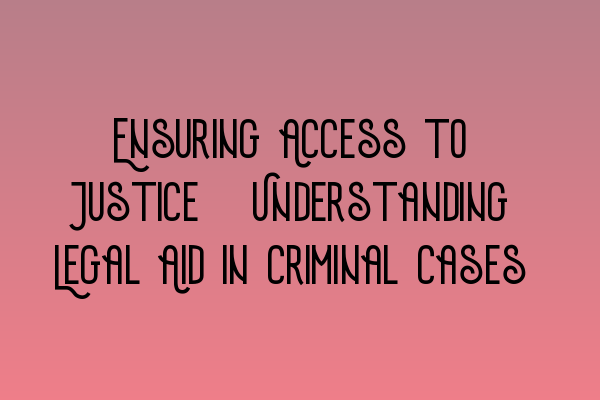Ensuring Access to Justice: Understanding Legal Aid in Criminal Cases
Introduction:
Access to justice is a fundamental principle of any fair and democratic society. In criminal cases, the provision of legal aid plays a pivotal role in guaranteeing that everyone, regardless of their socio-economic background, is able to defend themselves in a court of law. In this blog post, we will delve into the intricacies of legal aid in criminal cases, exploring its importance, eligibility criteria, and the process of obtaining it.
What is Legal Aid?
Legal aid is a system designed to provide financial assistance to individuals who cannot afford legal representation. It ensures that individuals accused of crimes have access to legal advice, representation, and support, thus ensuring a fair trial. Legal aid is not solely restricted to criminal cases but also extends to other areas of law, such as family, immigration, and housing.
Importance of Legal Aid in Criminal Cases:
1) Presumption of innocence: Legal aid upholds the principle that individuals are presumed innocent until proven guilty. It enables defendants to effectively navigate the complex legal system and secure fair treatment.
2) Balance of power: Legal aid helps restore the balance of power between the accused and the prosecution. It ensures that individuals facing criminal charges have equal access to legal expertise, regardless of their financial situation.
3) Quality of defense: Legal aid facilitates the provision of competent legal representation. This ensures that defendants receive a fair and robust defense, which is crucial for maintaining the integrity of the justice system.
Eligibility for Legal Aid in Criminal Cases:
To be eligible for legal aid in criminal cases, individuals must meet specific criteria related to their financial means, seriousness of the offense, and the likelihood of imprisonment. The eligibility criteria typically consider factors such as income, capital assets, and the availability of other financial resources.
The Process of Obtaining Legal Aid:
1) Initial assessment: The first step in obtaining legal aid is to apply for an initial assessment. This involves completing a form that gathers information about your financial situation, the nature of the offense, and other relevant details.
2) Means testing: Once the initial assessment form is submitted, it undergoes a means testing process. This involves assessing your income, capital, and expenditure to determine whether you qualify for legal aid.
3) Legal aid decision: After the means testing process, you will be notified of the decision regarding your legal aid application. If approved, you will receive a legal aid certificate, which allows you to access legal representation.
4) Choosing a legal representative: Once you have obtained a legal aid certificate, you can choose a solicitor or barrister from the list of authorized legal aid practitioners. It is essential to select a professional with expertise in criminal law to ensure effective representation.
Conclusion:
Legal aid in criminal cases is a fundamental pillar of the justice system. It guarantees that individuals, regardless of their financial circumstances, have equal access to legal representation and support. By ensuring access to justice for all, legal aid upholds the principles of fairness, presumption of innocence, and a robust defense. Understanding the eligibility criteria and the process of obtaining legal aid empowers individuals to exercise their right to a fair trial.
